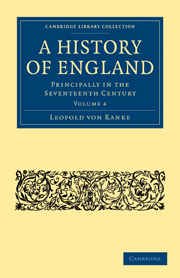Book contents
- Frontmatter
- Contents
- BOOK XVI THE LATER YEARS OF CHARLES II, 1675—1685 WHIGS AND TORIES
- INTRODUCTION
- CHAP. I Parliament in 1675. Formation of new parties
- CHAP. II The fourteen months' prorogation. Parliamentary Session of 1677
- CHAP. III Dynastic and political alliance of Charles II with the Prince of Orange
- CHAP. IV Complications at the conclusion of the Peace of Nimuegen. Alliance of Louis XIV with the Parliamentary opposition in England
- CHAP. V Denunciation of a Jesuit conspiracy. Last Session of the Parliament of the Restoration
- CHAP. VI Parliament of 1679
- CHAP. VII Parliamentary interim, 1679, 1680
- CHAP. VIII The Parliamentary Session of 1680
- CHAP. IX Parliament at Oxford, March 1680, 1681
- CHAP. X Antagonism of the Prince of Orange and the Duke of York
- CHAP. XI Reaction against the Whigs. Rye-House Plot. Execution of Lord William Russell
- CHAP. XII End of Charles II's Government
- BOOK XVII REIGN OF JAMES II, FEBRUARY 1685 TO SEPTEMBER 1688
- BOOK XVIII THE FALL OF JAMES II IN ITS CONNEXION WITH THE EUROPEAN CONFLICTS WHICH MARKED THE CLOSE OF 1688
- BOOK XIX COMPLETION OF THE REVOLUTION IN THE THREE KINGDOMS, 1688—1691
- Frontmatter
- Contents
- BOOK XVI THE LATER YEARS OF CHARLES II, 1675—1685 WHIGS AND TORIES
- INTRODUCTION
- CHAP. I Parliament in 1675. Formation of new parties
- CHAP. II The fourteen months' prorogation. Parliamentary Session of 1677
- CHAP. III Dynastic and political alliance of Charles II with the Prince of Orange
- CHAP. IV Complications at the conclusion of the Peace of Nimuegen. Alliance of Louis XIV with the Parliamentary opposition in England
- CHAP. V Denunciation of a Jesuit conspiracy. Last Session of the Parliament of the Restoration
- CHAP. VI Parliament of 1679
- CHAP. VII Parliamentary interim, 1679, 1680
- CHAP. VIII The Parliamentary Session of 1680
- CHAP. IX Parliament at Oxford, March 1680, 1681
- CHAP. X Antagonism of the Prince of Orange and the Duke of York
- CHAP. XI Reaction against the Whigs. Rye-House Plot. Execution of Lord William Russell
- CHAP. XII End of Charles II's Government
- BOOK XVII REIGN OF JAMES II, FEBRUARY 1685 TO SEPTEMBER 1688
- BOOK XVIII THE FALL OF JAMES II IN ITS CONNEXION WITH THE EUROPEAN CONFLICTS WHICH MARKED THE CLOSE OF 1688
- BOOK XIX COMPLETION OF THE REVOLUTION IN THE THREE KINGDOMS, 1688—1691
Summary
Neither a republic nor an absolute monarchy was seriously contemplated in England at this period. There were still many men in whom the passions of the fanatics and republicans continued to work; but the general feeling of the nation was opposed to their return at any time to power. And Charles II could never flatter himself that he would acquire such an authority as Louis XIV possessed in France. For he had been restored by Parliament, and we have seen how Parliament, though at first devoted to his authority and allied with him, gradually took up a position of resistance.
The questions of the day were of a constitutional nature, and were concerned with determining the limits of the authority of the Crown and of the two Houses in accordance with the Parliamentary constitution; and it is precisely this question of limitation, at this time practically undetermined, that lends a new and general interest to affairs.
Parliament calls the King's ministers to account; the King, if the decision is contrary to his inclination, makes difficulties about dismissing them from his service.
Parliament lays claim to the control over the expenditure of the moneys granted by it; the King reserves the right of examining the account books himself, and judging about them.
- Type
- Chapter
- Information
- A History of EnglandPrincipally in the Seventeenth Century, pp. 3 - 6Publisher: Cambridge University PressPrint publication year: 2010First published in: 1875



